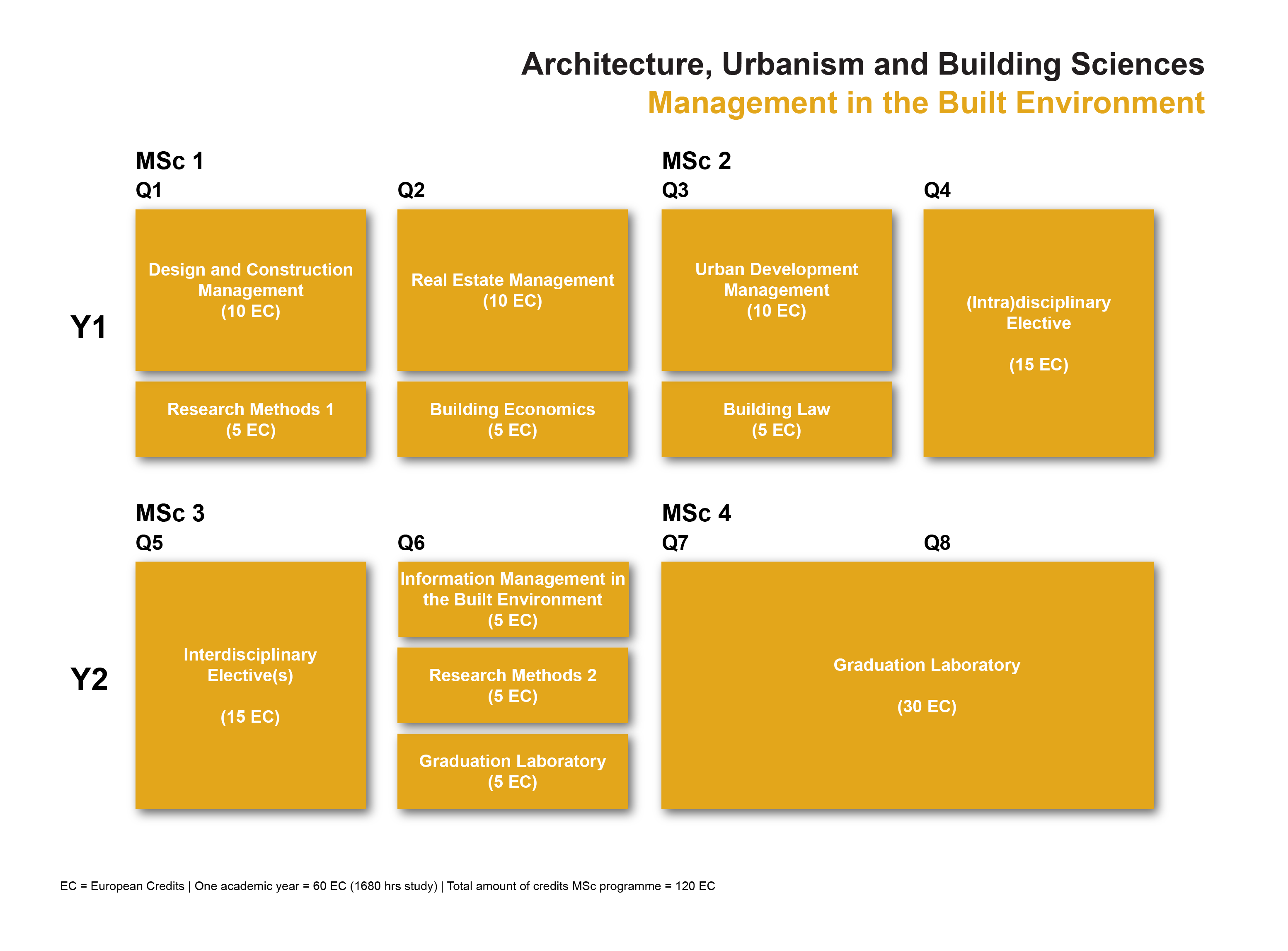Programme
The first year of the Management in the Built Environment track’s programme focuses on the development of core knowledge and skills while the second year focuses on application and synthesis of this knowledge through a graduation project. Students are provided with a coherent overall perspective, giving them a capability to integrate processes, phasing and different scales, while addressing stakeholder concerns.
Academic year 2024-2025
During the first year you will acquire advanced knowledge and skills in managing the entire life cycle of the built environment.
First semester (MSc1)
MSc1 is oriented towards knowledge acquisition, drawing from both academic sources and illustrative case studies. Two courses offer an introduction to respectively Design and Construction Management and Real Estate Management. Both courses use real life cases.
Design & Construction Management targets the development and management of design and construction at the scale of a building. Management issues regarding the design and the construction of a building are examined on the basis of a real life case.
Real Estate Management is concerned with the supply of and demand for building stock, for private firms as well as public institutions and housing.
The other two courses cover Research Methods (including Data Management and Data Ethics) and Building Economics (including Financial Feasibility of Real Estate Investments).
Second semester (MSc2)
Where the courses in the first semester focus on the scales of the individual building and portfolios, the third quarter focusses on the scale of the urban development project. This is achieved through the Urban Development Management course which looks at the processes involved with the development of larger urban projects. This course includes a game in which you apply the knowledge you gained from literature and cases.
This is complemented with a course on Building Law (including Planning Law).
In the fourth quarter you join one of the (intra)disciplinary courses in which you are challenged to work together with students from other tracks within the Master Architecture, Urbanism and Building Sciences on overarching themes.
Check the Study Guide for a full overview of the (intra)disciplinary electives available to Management in the Built Environment track students.
Academic year 2025-2026*
From September 2025 the fifth quarter (Q5) allows you to choose electives offered by or in collaboration with other TU Delft faculties, or with public or private partners. This new Q5 offers students the opportunity to gain knowledge and experience from collaborating in projects with other disciplines or challenges found outside the walls of our own faculty. More information on the electives offered in Q5 is available as from April 2025.
Graduation
The last two quarters in the final year you work on your individual graduation project. You can choose from several graduation themes. There is a methodological programme that provides you with sound research methods in support of your graduation project work. Also, a course on Information Management in the Built Environment provides up-to-date knowledge and skills for dealing with data.
Almost all students of MSc track Management in the Built Environment carry out their graduation research project in a company or (non) governmental organisation. This enhances the real life application of the results of the graduation thesis project.
Detailed information on graduation
Video Impression of Sustainable Human Habitats: Students can specialise in Sustainable Human Habitats in the second year of the MSc programme by choosing a specific elective and joining a graduation theme group.
Cross domain graduation studios
Master students Architecture, Urbanism and Building Sciences can, instead of the regular graduation themes, choose during their second year for one of the cross domain graduation studios. Students from the Management in the Built Environment track can choose for:
* Are you currently studying in your second year of this Master track? Please visit the BK Student Portal for your programme.
Additional information
For more information on all courses, please visit the study guide.
